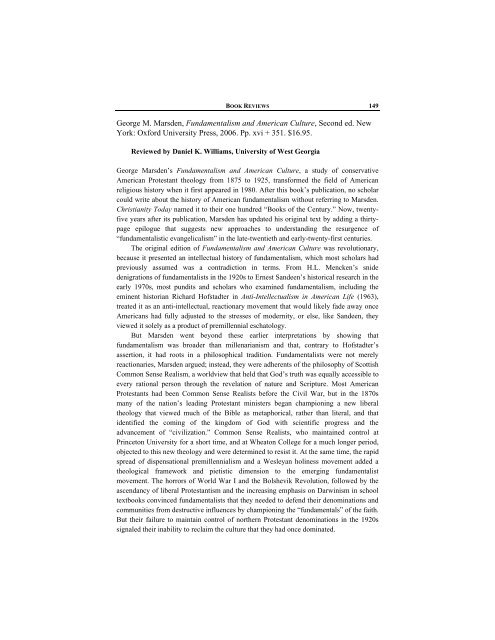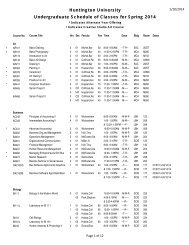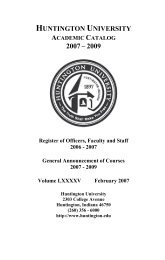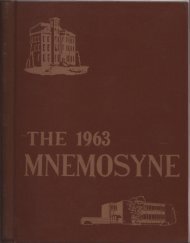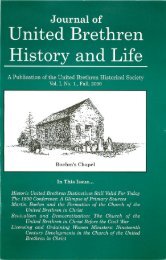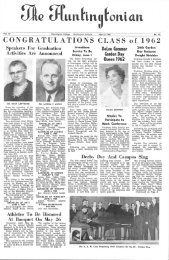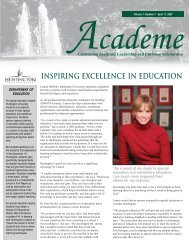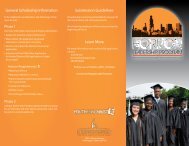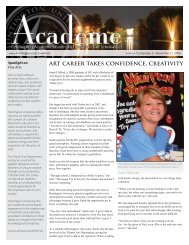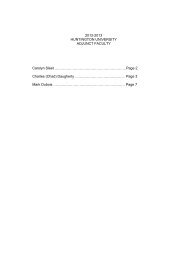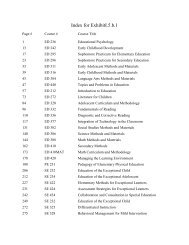Gillian Clark, Christianity and Roman Society - Huntington University
Gillian Clark, Christianity and Roman Society - Huntington University
Gillian Clark, Christianity and Roman Society - Huntington University
You also want an ePaper? Increase the reach of your titles
YUMPU automatically turns print PDFs into web optimized ePapers that Google loves.
BOOK REVIEWS 149<br />
George M. Marsden, Fundamentalism <strong>and</strong> American Culture, Second ed. New<br />
York: Oxford <strong>University</strong> Press, 2006. Pp. xvi + 351. $16.95.<br />
Reviewed by Daniel K. Williams, <strong>University</strong> of West Georgia<br />
George Marsden’s Fundamentalism <strong>and</strong> American Culture, a study of conservative<br />
American Protestant theology from 1875 to 1925, transformed the field of American<br />
religious history when it first appeared in 1980. After this book’s publication, no scholar<br />
could write about the history of American fundamentalism without referring to Marsden.<br />
<strong>Christianity</strong> Today named it to their one hundred “Books of the Century.” Now, twentyfive<br />
years after its publication, Marsden has updated his original text by adding a thirtypage<br />
epilogue that suggests new approaches to underst<strong>and</strong>ing the resurgence of<br />
“fundamentalistic evangelicalism” in the late-twentieth <strong>and</strong> early-twenty-first centuries.<br />
The original edition of Fundamentalism <strong>and</strong> American Culture was revolutionary,<br />
because it presented an intellectual history of fundamentalism, which most scholars had<br />
previously assumed was a contradiction in terms. From H.L. Mencken’s snide<br />
denigrations of fundamentalists in the 1920s to Ernest S<strong>and</strong>een’s historical research in the<br />
early 1970s, most pundits <strong>and</strong> scholars who examined fundamentalism, including the<br />
eminent historian Richard Hofstadter in Anti-Intellectualism in American Life (1963),<br />
treated it as an anti-intellectual, reactionary movement that would likely fade away once<br />
Americans had fully adjusted to the stresses of modernity, or else, like S<strong>and</strong>een, they<br />
viewed it solely as a product of premillennial eschatology.<br />
But Marsden went beyond these earlier interpretations by showing that<br />
fundamentalism was broader than millenarianism <strong>and</strong> that, contrary to Hofstadter’s<br />
assertion, it had roots in a philosophical tradition. Fundamentalists were not merely<br />
reactionaries, Marsden argued; instead, they were adherents of the philosophy of Scottish<br />
Common Sense Realism, a worldview that held that God’s truth was equally accessible to<br />
every rational person through the revelation of nature <strong>and</strong> Scripture. Most American<br />
Protestants had been Common Sense Realists before the Civil War, but in the 1870s<br />
many of the nation’s leading Protestant ministers began championing a new liberal<br />
theology that viewed much of the Bible as metaphorical, rather than literal, <strong>and</strong> that<br />
identified the coming of the kingdom of God with scientific progress <strong>and</strong> the<br />
advancement of “civilization.” Common Sense Realists, who maintained control at<br />
Princeton <strong>University</strong> for a short time, <strong>and</strong> at Wheaton College for a much longer period,<br />
objected to this new theology <strong>and</strong> were determined to resist it. At the same time, the rapid<br />
spread of dispensational premillennialism <strong>and</strong> a Wesleyan holiness movement added a<br />
theological framework <strong>and</strong> pietistic dimension to the emerging fundamentalist<br />
movement. The horrors of World War I <strong>and</strong> the Bolshevik Revolution, followed by the<br />
ascendancy of liberal Protestantism <strong>and</strong> the increasing emphasis on Darwinism in school<br />
textbooks convinced fundamentalists that they needed to defend their denominations <strong>and</strong><br />
communities from destructive influences by championing the “fundamentals” of the faith.<br />
But their failure to maintain control of northern Protestant denominations in the 1920s<br />
signaled their inability to reclaim the culture that they had once dominated.


